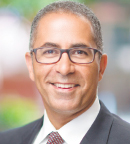PRESS BRIEFING moderator Joseph Mikhael, MD, Professor of Applied Cancer Research and Drug Discovery, Translational Genomics Research Institute, City of Hope Cancer Center in Phoenix, noted that traditional models are based on simplicity, and the scoring system contains few variables. “In an era enhanced by artificial intelligence and Web-based tools, we can include more variables and refine our model,” he said. Two patients may appear to have virtually the same type of disease, but they can have divergent disease courses. It is a “disservice to treat them exactly the same way,” he said.

Joseph Mikhael, MD
Dr. Mikhael said the improved model essentially “catches up” with the kind of personalization that he’s come to expect in other areas of life. “How is it that I can walk around San Diego and look down at my cellphone, and it suggests to me where I should eat dinner based on where I’ve eaten dinner over the past 3 months? Yet when I’m in my clinic and trying to choose what’s best for my patients, we have these archaic methods,” he told journalists. “That concept is going to change. It’s already changing. We’re going to be taking the big-data approach to information technology and applying it to provide the best care of our patients.” ■
DISCLOSURE: Dr. Mikhael has received research funding from AbbVie, Celgene, Onyx, and Sanofi.

